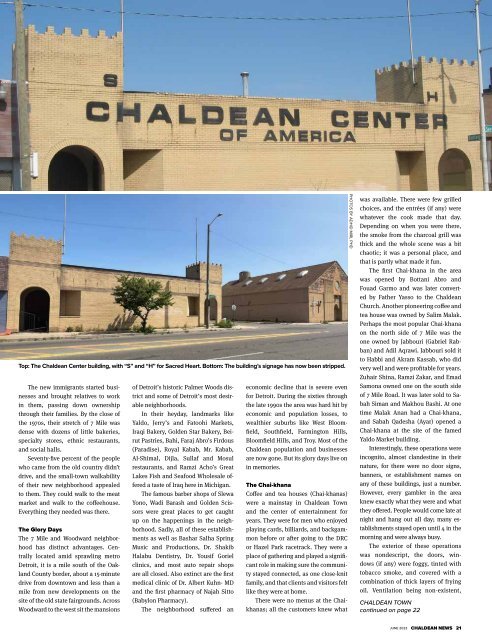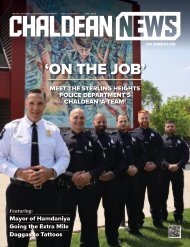You also want an ePaper? Increase the reach of your titles
YUMPU automatically turns print PDFs into web optimized ePapers that Google loves.
Top: The Chaldean Center building, with “S” and “H” for Sacred Heart. Bottom: The building’s signage has now been stripped.<br />
The new immigrants started businesses<br />
and brought relatives to work<br />
in them, passing down ownership<br />
through their families. By the close of<br />
the 1970s, their stretch of 7 Mile was<br />
dense with dozens of little bakeries,<br />
specialty stores, ethnic restaurants,<br />
and social halls.<br />
Seventy-five percent of the people<br />
who came from the old country didn’t<br />
drive, and the small-town walkability<br />
of their new neighborhood appealed<br />
to them. They could walk to the meat<br />
market and walk to the coffeehouse.<br />
Everything they needed was there.<br />
The Glory Days<br />
The 7 Mile and Woodward neighborhood<br />
has distinct advantages. Centrally<br />
located amid sprawling metro<br />
Detroit, it is a mile south of the Oakland<br />
County border, about a 15-minute<br />
drive from downtown and less than a<br />
mile from new developments on the<br />
site of the old state fairgrounds. Across<br />
Woodward to the west sit the mansions<br />
of Detroit’s historic Palmer Woods district<br />
and some of Detroit’s most desirable<br />
neighborhoods.<br />
In their heyday, landmarks like<br />
Yaldo, Jerry’s and Fatoohi Markets,<br />
Iraqi Bakery, Golden Star Bakery, Beirut<br />
Pastries, Bahi, Faraj Abro’s Firdous<br />
(Paradise), Royal Kabab, Mr. Kabab,<br />
Al-Shimal, Dijla, Sullaf and Mosul<br />
restaurants, and Ramzi Acho’s Great<br />
Lakes Fish and Seafood Wholesale offered<br />
a taste of Iraq here in Michigan.<br />
The famous barber shops of Slewa<br />
Yono, Wadi Barash and Golden Scissors<br />
were great places to get caught<br />
up on the happenings in the neighborhood.<br />
Sadly, all of these establishments<br />
as well as Bashar Salha Spring<br />
Music and Productions, Dr. Shakib<br />
Halabu Dentistry, Dr. Yousif Goriel<br />
clinics, and most auto repair shops<br />
are all closed. Also extinct are the first<br />
medical clinic of Dr. Albert Kuhn- MD<br />
and the first pharmacy of Najah Sitto<br />
(Babylon Pharmacy).<br />
The neighborhood suffered an<br />
economic decline that is severe even<br />
for Detroit. During the sixties through<br />
the late 1990s the area was hard hit by<br />
economic and population losses, to<br />
wealthier suburbs like West Bloomfield,<br />
Southfield, Farmington Hills,<br />
Bloomfield Hills, and Troy. Most of the<br />
Chaldean population and businesses<br />
are now gone. But its glory days live on<br />
in memories.<br />
The Chai-khana<br />
Coffee and tea houses (Chai-khanas)<br />
were a mainstay in Chaldean Town<br />
and the center of entertainment for<br />
years. They were for men who enjoyed<br />
playing cards, billiards, and backgammon<br />
before or after going to the DRC<br />
or Hazel Park racetrack. They were a<br />
place of gathering and played a significant<br />
role in making sure the community<br />
stayed connected, as one close-knit<br />
family, and that clients and visitors felt<br />
like they were at home.<br />
There were no menus at the Chaikhanas;<br />
all the customers knew what<br />
PHOTOS BY ADHID MIRI, PHD<br />
was available. There were few grilled<br />
choices, and the entrées (if any) were<br />
whatever the cook made that day.<br />
Depending on when you were there,<br />
the smoke from the charcoal grill was<br />
thick and the whole scene was a bit<br />
chaotic; it was a personal place, and<br />
that is partly what made it fun.<br />
The first Chai-khana in the area<br />
was opened by Bottani Abro and<br />
Fouad Garmo and was later converted<br />
by Father Yasso to the Chaldean<br />
Church. Another pioneering coffee and<br />
tea house was owned by Salim Malak.<br />
Perhaps the most popular Chai-khana<br />
on the north side of 7 Mile was the<br />
one owned by Jabbouri (Gabriel Rabban)<br />
and Adil Aqrawi. Jabbouri sold it<br />
to Habbi and Akram Kassab, who did<br />
very well and were profitable for years.<br />
Zuhair Shina, Ramzi Zakar, and Emad<br />
Samona owned one on the south side<br />
of 7 Mile Road. It was later sold to Sabah<br />
Siman and Makhou Bashi. At one<br />
time Malak Anan had a Chai-khana,<br />
and Sabah Qadesha (Ayar) opened a<br />
Chai-khana at the site of the famed<br />
Yaldo Market building.<br />
Interestingly, these operations were<br />
incognito, almost clandestine in their<br />
nature, for there were no door signs,<br />
banners, or establishment names on<br />
any of these buildings, just a number.<br />
However, every gambler in the area<br />
knew exactly what they were and what<br />
they offered. People would come late at<br />
night and hang out all day; many establishments<br />
stayed open until 4 in the<br />
morning and were always busy.<br />
The exterior of these operations<br />
was nondescript, the doors, windows<br />
(if any) were foggy, tinted with<br />
tobacco smoke, and covered with a<br />
combination of thick layers of frying<br />
oil. Ventilation being non-existent,<br />
CHALDEAN TOWN<br />
continued on page 22<br />
<strong>JUNE</strong> <strong>2023</strong> CHALDEAN NEWS 21

















